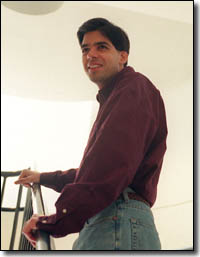Law School Student Aces T.V. Pop Quiz

Rahim Oberholtzer remembers his shock when Maury Povichs voice came over his headset telling him he had won more than a million dollars.
It was $1.12 million, to be precise. Standing in the soundproof booth, able to see only his own reflection in the one-way glass, Oberholtzer felt completely isolated, cut off from what was happening outside. But the studio audience and millions of viewers at home knew that his opponent on NBCs high-stakes game show Twenty One had missed a crucial question, making Oberholtzer the big winner.
“It still hasnt really sunk in yet,” said the third-year Harvard Law School student. “I wont get the check for another three months. But I did begin to feel it was real when they wheeled out the cash.”
One of the shows regular routines is to present contestants with their winnings in cash, reminiscent of a Las Vegas casino. With most winners, Povich stuffs the bundles of $100 bills into a canvas tote bag, but the bag was too small for Oberholtzers winnings, and they had to be presented on a tray.
“It was real money too,” he said. “I thought it would be real bills on the outside and the rest paper, but they were real all the way through. They were very careful with it. There were two security guards just outside camera range who took the money as soon as the show was over.”
Oberholtzer cant get over the fortuitousness of his sudden acquisition of wealth.
“I was watching some random sitcom when I happened to see an announcement that NBC was doing a contestant search in Boston for a new quiz show.”
Oberholtzer showed up along with other hopefuls, passed a written exam, then played a practice game of Twenty One. Tapes of the practice sessions were sent to Los Angeles where NBC executives made the final selections. Four days later Oberholtzer received a call asking him to come to L.A. for the weekend of Jan. 22.
“My initial reaction was to put it off for a week or two because I had an exam on Monday morning, but they promised to put me on the red-eye special on Sunday night. I decided to do it because I figured you dont get a chance like this every day.”
With incredible self-control, Oberholtzer managed not to tell his family or friends about his victory until they saw the results for themselves when the final show aired two weeks later on Feb. 2.
“I didnt tell anyone, not even my parents, so they could feel the same sense of excitement that I did. I just kept saying, You have to watch, you have to watch! And they asked, How much did you win? and I said, I cant tell you. It was hard, but it was worth it.”
Oberholtzer, whose first name reflects the heritage of his Pakistani mother, grew up outside Houston, Texas, and earned his bachelors degree from the University of Texas at Austin. He plans to take a job in finance after graduating from law school, an aim he has always had, even before his recent increase in personal finances.
“Itll be nice, though, because now Ill learn how to invest the money.”
Actually, Oberholtzer expects to invest only a fraction of it. Taxes, he said, will take almost half. With a large portion of the remainder, he plans to pay off his student loans, help his mother with medical expenses, and set up a scholarship fund for future law school students, either at Harvard or at UT-Austin.
“I almost didnt come here because the cost was so high. Id like to give other potential students the chance to get an education.”
With whats left over, Oberholtzer plans to take a vacation this summer and then fund that investment portfolio.




